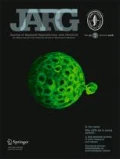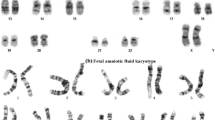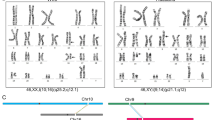Abstract
Purpose
To perform Preimplantation Genetic Diagnosis (PGD) on a paternal Brca2 unknown mutation carrier with early-onset breast cancer, whose paternal grandmother and mother had breast cancer at 60s.
Method
Elucidating the linkage via single sperm haplotyping on patient's carrier brother, and identifying the genomic deletion via BLAST followed by PCR screening. PGD was subsequently conducted.
Result
The mutant allele was found by using 4 microsatellite and 2 intragenic SNP markers. Recombination was detected in 8 % of sperms. BLAST was utilized to locate putative hairpin structure(s), followed by PCR screening with seven sets of primers. A novel 2,596 bp deletion containing exon 15 ~ 16 was identified. Due to the severity of phenotype and the integrity of exon 11 encoding RAD51 binding domain, and the fact that the patient's mother also had breast cancer at her 60s, we speculate a possible coexistence of maternal breast cancer risk allele(s). Embryo biopsy was performed on day 3. Unaffected morula and blastocyst were replaced on day 5, resulting in a singleton livebirth. A breast lump appeared in the patient after delivery without the presence of malignant cells.
Conclusion
Concerning the assisted reproductive option for breast cancer patients, the possibility of coexistence of multiple familial risk alleles and the significance of each mutation to the phenotype should be evaluated. To eliminate misdiagnosis resulting from recombination and/or allelic drop-out, both direct mutation detection and linkage analysis approaches may be necessary. BLAST is a very useful and cost-effective tool for identifying large genomic deletion.





Similar content being viewed by others
References
Parkin DM, Bray F, Ferlay J, Pisani P. Global cancer statistics, 2002. CA Cancer J Clin. 2005;55(2):74–108.
Antoniou A, Pharoah PD, Narod S, Risch HA, Eyfjord JE, Hopper JL, et al. Average risks of breast and ovarian cancer associated with BRCA1 or BRCA2 mutations detected in case Series unselected for family history: a combined analysis of 22 studies. Am J Hum Genet. 2003;72(5):1117–30.
King MC, Marks JH, Mandell JB. Breast and ovarian cancer risks due to inherited mutations in BRCA1 and BRCA2. Science. 2003;302(5645):643–6.
Barnes DR, Antoniou AC. Unravelling modifiers of breast and ovarian cancer risk for BRCA1 and BRCA2 mutation carriers: update on genetic modifiers. J Intern Med. 2012;271(4):331–43.
Holloman WK. Unraveling the mechanism of BRCA2 in homologous recombination. Nat Struct Mol Biol. 2011;18(7):748–54.
Baer R, Lee WH. Functional domains of the BRCA1 and BRCA2 proteins. J Mammary Gland Biol Neoplasia. 1998;3(4):403–12.
Partridge AH, Gelber S, Peppercorn J, Sampson E, Knudsen K, Laufer M, et al. Web-based survey of fertility issues in young women with breast cancer. J Clin Oncol. 2004;22(20):4174–83.
Partridge AH, Gelber S, Peppercorn J, Ginsburg E, Sampson E, Rosenberg R, et al. Fertility and menopausal outcomes in young breast cancer survivors. Clin Breast Cancer. 2008;8(1):65–9.
Smith KR, Ellington L, Chan AY, Croyle RT, Botkin JR. Fertility intentions following testing for a BRCA1 gene mutation. Cancer Epidemiol Biomarkers Prev. 2004;13(5):733–40.
Wilkinson E. Preimplantation genetic diagnosis for mutated BRCA genes. Lancet Oncol. 2012;13(8):e331.
Jasper MJ, Liebelt J, Hussey ND. Preimplantation genetic diagnosis for BRCA1 exon 13 duplication mutation using linked polymorphic markers resulting in a live birth. Prenat Diagn. 2008;28(4):292–8.
Offit K, Sagi M, Hurley K. Preimplantation genetic diagnosis for cancer syndromes: a new challenge for preventive medicine. JAMA. 2006;296(22):2727–30.
Spits C, De Rycke M, Van Ranst N, Verpoest W, Lissens W, Van Steirteghem A, et al. Preimplantation genetic diagnosis for cancer predisposition syndromes. Prenat Diagn. 2007;27(5):447–56.
Sagi M, Weinberg N, Eilat A, Aizenman E, Werner M, Girsh E, et al. Preimplantation genetic diagnosis for BRCA1/2–a novel clinical experience. Prenat Diagn. 2009;29(5):508.
Chow JF, Yeung WS, Lau EY, Lam ST, Tong T, Ng EH, et al. Singleton birth after preimplantation genetic diagnosis for Huntington disease using whole genome amplification. Fertil Steril 2009;92(2):828 e7-10.
Lubinski J, Phelan CM, Ghadirian P, Lynch HT, Garber J, Weber B, et al. Cancer variation associated with the position of the mutation in the BRCA2 gene. Fam Cancer. 2004;3(1):1–10.
Gutierrez-Enriquez S, de la Hoya M, Martinez-Bouzas C. Sanchez de Abajo A, Ramon Y, Cajal T, et al. Screening for large rearrangements of the BRCA2 gene in Spanish families with breast/ovarian cancer. Breast Cancer Res Treat. 2007;103(1):103–7.
Hall MJ, Reid JE, Burbidge LA, Pruss D, Deffenbaugh AM, Frye C, et al. BRCA1 and BRCA2 mutations in women of different ethnicities undergoing testing for hereditary breast-ovarian cancer. Cancer. 2009;115(10):2222–33.
Fanale D, Amodeo V, Corsini LR, Rizzo S, Bazan V, Russo A. Breast cancer genome-wide association studies: there is strength in numbers. Oncogene. 2012;31(17):2121–8.
Michailidou K, Hall P, Gonzalez-Neira A, Ghoussaini M, Dennis J, Milne RL, et al. Large-scale genotyping identifies more than 40 novel breast cancer susceptibility loci. American Society of Human Genetics, 2012 Annual Meeting, 2012
Siddiq A, Couch FJ, Chen GK, Lindstrom S, Eccles D, Millikan RC, et al. A meta-analysis of genome-wide association studies of breast cancer identifies two novel susceptibility loci at 6q14 and 20q11. Hum Mol Genet. 2012;21(24):5373–84.
Kotsopoulos J, Librach CL, Lubinski J, Gronwald J, Kim-Sing C, Ghadirian P, et al. Infertility, treatment of infertility, and the risk of breast cancer among women with BRCA1 and BRCA2 mutations: a case–control study. Cancer Causes Control. 2008;19(10):1111–9.
Acknowledgments
The study was supported by the Department Fund.
Author information
Authors and Affiliations
Corresponding author
Additional information
Qingxue Wang and Judy FC Chow are co-first authors.
Capsule The possibility of coexistence of multiple cancer risk alleles should be considered during IVF-PGD workup for cancer patients. Both direct mutation detection and linkage analysis approaches may be necessary to eliminate misdiagnosis resulting from recombination and/or allelic drop-out in PGD.
Rights and permissions
About this article
Cite this article
Wang, Q., Chow, J.F., Yeung, W.S. et al. Preimplantation genetic diagnosis using combined strategies on a breast cancer patient with a novel genomic deletion in BRCA2. J Assist Reprod Genet 31, 1719–1726 (2014). https://doi.org/10.1007/s10815-014-0355-4
Received:
Accepted:
Published:
Issue Date:
DOI: https://doi.org/10.1007/s10815-014-0355-4




